Difference between revisions of "LB Summer 2017 JLab Vertex Work"
| Line 71: | Line 71: | ||
=Point Target= | =Point Target= | ||
| − | Below are the histograms for a target with generated Vx,Vy, and Vz all equal to zero. Note that these differences are not cuts, but the reconstructed vertices for the entire target. | + | Below are the histograms for a target with generated Vx,Vy, and Vz all equal to zero. Note that these differences are not cuts, but the reconstructed vertices for the entire target. A sample command line is |
| + | |||
| + | CLAS12->Draw("GenPart.z[0]/10 - Event.z[0]>>(200,-2,2)","Event.PID[0]==11"); | ||
Revision as of 22:45, 18 June 2017
Useful Commands
To Run GEMC 4a.0.0 on LDS3
~/src/CLAS/GEMC/clas12Tags/4a.0.0/source/gemc -USE_GUI=0 -INPUT_GEN_FILE="LUND,test.LUND" -N=10 eg12_sol_XRaster.gcard
To Convert the GEMC .ev output file to a hipo file
~/src/CLAS/coatjava-4a.0.0/bin/evio2hipo -r 11 -t -1.0 -s 1.0 -o out.hipo SIDIS.evio
To perform the reconstruction on the .hipo file that has been converted from a .ev file
~/src/CLAS/coatjava-4a.0.0/bin/notsouseful-util -o rec.hipo -i out.hipo -c 1
~/src/CLAS/coatjava-4a.0.0/bin/run-groovy ../../../SweetSpot/Hipo2Text.groovy SIDIS_Deut_5.hipo
Simulation Setup
The following simulations were done using GEMC 4a.0.0.It is useful to note that the LUND file vertices are in units of cm, while the reconstructed events are in cm as well. It should be noted that the generated position of the particle in the GenPart Bank is in mm, so it must be divided by 10 to get the right units.Below is a sample gcard that was used for many of my simulations
<gcard>
<detector name="../../../../../../../clas12Tags/4a.0.0/experiments/clas12/fc/forwardCarriage" factory="TEXT" variation="original"/>
<detector name="../../../../../../../clas12Tags/4a.0.0/experiments/clas12/dc/dc" factory="TEXT" variation="java"/>
<detector name="../../../../../../../clas12Tags/4a.0.0/experiments/clas12/ec/ec" factory="TEXT" variation="java"/>
<detector name="../../../../../../../clas12Tags/4a.0.0/experiments/clas12/ctof/ctof" factory="TEXT" variation="cad"/>
<detector name="../../../../../../../clas12Tags/4a.0.0/experiments/clas12/ctof/cad/" factory="CAD"/>
<detector name="../../../../../../../clas12Tags/4a.0.0/experiments/clas12/ftof/ftof" factory="TEXT" variation="java"/>
<detector name="../../../../../../../clas12Tags/4a.0.0/experiments/clas12/htcc/htcc" factory="TEXT" variation="original"/>
<detector name="../../../../../../../clas12Tags/4a.0.0/experiments/clas12/pcal/pcal" factory="TEXT" variation="java"/>
<detector name="../../../../../../../clas12Tags/4a.0.0/experiments/clas12/magnets/solenoid" factory="TEXT" variation="original"/>
<detector name="../../../../../../../clas12Tags/4a.0.0/experiments/clas12/magnets/torus" factory="TEXT" variation="original"/>
<detector name ="../../../../../../../clas12Tags/4a.0.0/experiments/clas12/targets/target" factory="TEXT" variation="lH2"/>
<detector name="../../../../../../../clas12Tags/4a.0.0/experiments/clas12/bst/bst" factory="TEXT" variation="java"/>
<detector name="../../../../../../../clas12Tags/4a.0.0/experiments/clas12/cnd/cnd" factory="TEXT" variation="original"/>
<detector name="../../../../../../../clas12Tags/4a.0.0/experiments/clas12/micromegas/micromegas" factory="TEXT" variation="original"/>
<option name="SCALE_FIELD" value="clas12-torus-big, -1"/>
<option name="HALL_FIELD" value="clas12-solenoid"/>
<option name="OUTPUT" value="evio,eg12_sol_75k_NoRaster_30DegRot.ev"/>
</gcard>
and here is a sample GEMC command line that was used for the simulations. Obviously the name of the LUND file, the number of events, and the output filename will change.
~/src/CLAS/GEMC/clas12Tags/4a.0.0/source/gemc -USE_GUI=0 -INPUT_GEN_FILE="LUND,test.LUND" -N=10 eg12_sol_XRaster.gcard
The LUND files were created using WriteLUND.C. The vertex positions are generated by a RNG whose output is between 2 numbers. This will determine if the target is 1D,2D,3D. To check the angles on the LUND files, run a GEMC simulation with only a few events to see where the particles hit within the detector. For angles
theta= 25 Degrees
phi= 30 Degrees
This has been investigated for GEMC 2.5. There seems to be a problem with the gui such that the detector will not appear. Assuming the entire coordinate system hasn't changed, then the results should be the same as seen here Phi angle gcard vs. LUND
Point Target
Below are the histograms for a target with generated Vx,Vy, and Vz all equal to zero. Note that these differences are not cuts, but the reconstructed vertices for the entire target. A sample command line is
CLAS12->Draw("GenPart.z[0]/10 - Event.z[0]>>(200,-2,2)","Event.PID[0]==11");
| X Vertex Info | Y Vertex Info | Z Vertex Info | ||
|---|---|---|---|---|
| Generated Particles | 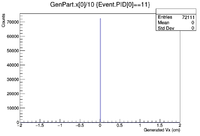 |
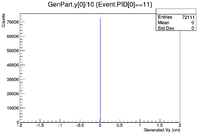 |
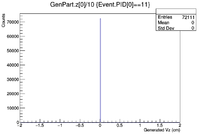
| |
| Reconstructed Particles | 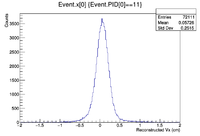 |
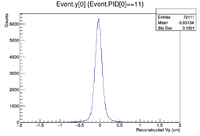 |
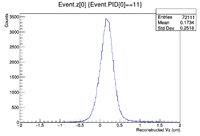
| |
| Vertex Differences | 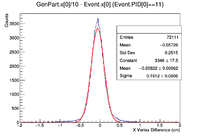 |
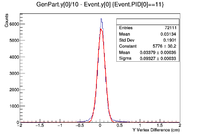 |
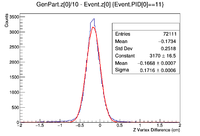
| |
| Resolution (cm) | 0.1612 +/- 0.0006 | 0.09327 +/- 0.00033 | 0.1716 +/- 0.0006 |
Line Targets
| 2cm X Raster, Y=0,Z=0 | 2 cm Y Raster, X=0,Z=0 | 2 cm Z Raster ,X=0,Y=0 | ||
|---|---|---|---|---|
| Vx Difference | ||||
| Vy Difference | ||||
| Vz Difference | ||||
| X Resolution (cm) | ||||
| Y Resolution(cm) | ||||
| Z Resolution (cm) |